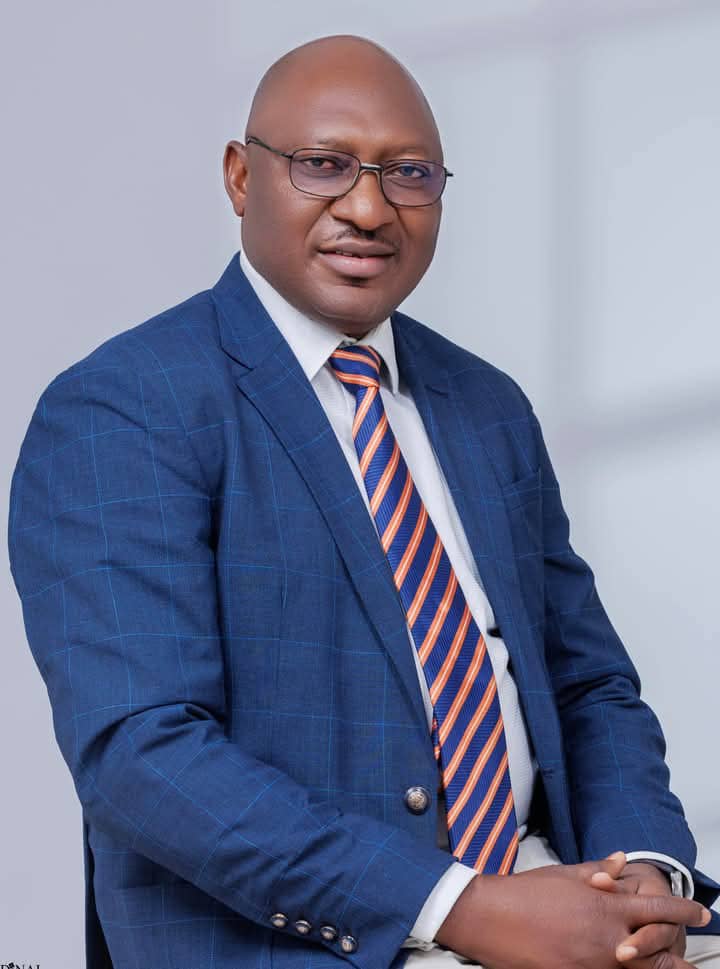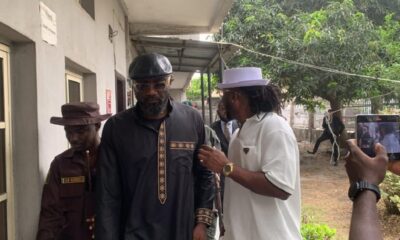Opinion
FOREX code, Cardoso’s approach to stabilizing the naira

By Dr. Ibrahim Modibbo
Within hours after the launch of foreign exchange code by the Governor of the Central Bank of Nigeria (CBN), Olayemi Cardoso, on January 28, 2025, in Abuja, the positives from this move by the apex bank emerged as the naira appreciated against the US dollar. Following the launch of the FX code on Tuesday, the naira appreciated by 0.97 percent, gaining N16 against the dollar in the parallel market, by trading at an average rate of N1, 634 compared to N1, 650 it traded on Monday. In the official window, data from the CBN revealed that the naira was quoted at N1, 533.50 to the dollar at the Nigerian Foreign Exchange Market (NFEM).
Cardoso’s newly introduced FX code is aimed at improving market liquidity, enhancing transparency, and providing guidance for all those participating in the country’s foreign exchange sector. The code represents a set of principles that are not only encouraged, but accepted as best practices in the global foreign exchange market. The CBN as the regulator of Nigeria’s turbulent forex market drafted the FX code to address risks associated with the emerging financial landscape in the nation, while also strengthening the integrity and functionality of the foreign exchange market.
The CBN in developing the FX code is responding to Nigeria’s financial transformation in recent years and the attendant risks associated with such a growth, in spite of significant progress recorded. The code seeks to establish standards that ensure the efficient functioning of the wholesale FX market, further reinforcing the country’s flexible exchange rate system. It will further promote a robust market that’s characterised by fairness, openness, and adequate transparency, enabling a diverse group of participants to engage effectively at competitive rates that reflect accurate market information. It outlines behavioral standards and best practices that align with global expectations.
Addressing industry players at the launch and alluding to the deep insights and interactions with them, Cardoso said that the acceptance of the FX code reflects the collective vision of everyone for a foreign exchange market built on integrity, fairness, transparency and efficiency, based on its critical nature for Nigeria’s economic growth and stability.
Making reference to the words of the late Nelson Mandela, on the need for leaders to be great listeners, the CBN governor admitted that the apex bank through its interactions with industry players, better understands the perspectives, concerns, and recommendations they expressed. He said the ideas shared reaffirmed the collective commitment to shaping a more resilient and transparent FX market.
He declared that the FX code represents a decisive step forward by the CBN, to set a clear and enforceable standards for ethical conduct, transparency, and good governance in Nigeria’s foreign exchange market. The code, Cardoso added is a firm signal that business-as-usual in the forex market has ended because the code is a blueprint for the future, that is grounded in the hard lessons of the past.
“We must not forget where we are coming from. The era of multiple exchange rates, which created privileges for a select few at the expense of most Nigerians, severely undermined market integrity. As an example, the $7billion of FX backlogs that has taken over 12 months to verify has led to the discovery of multiple unethical and even illegal practices that we should not be proud of as a nation,” he disclosed.
The CBN governor further stated that the period of unprecedented ways-and-means-financing that inflicted significant damage on Nigeria’s economy, contributing to rising inflation, currency depreciation, and eroded public confidence in government’s ability to deal with adverse economic issues is over.
“These practices must never return. The FX Code is a firm rejection of such distortions and an equally firm commitment to a future defined by fairness, trust and market-driven principles. Let us be clear: the system itself played a key role in the challenges of the past.
“Unethical behaviours and systemic abuses – whether by those with privileged access or by complicit participants – eroded public trust and harmed our economy. We will not tolerate any attempts to revert to those practices. Any individual or institution that violates the FX Code will face swift and decisive sanctions,” Cardoso warned.
Predicting the future, he expressed confidence that the nation’s journey towards market reforms is already yielding positive results. According to him, 2024 was marked by structural reforms which sought to return the naira to a freely determined market price and ease volatility.
Such reforms include the discontinuation of quasi-fiscal interventions, unifying the exchange rate windows, clearing a backlog of foreign exchange commitments, and recalibrating monetary policy tools to redirect the course of Nigeria’s economy, restore order and credibility to our FX market, and refocus the CBN on discharging its core mandates.
Cardoso used the opportunity of the FX code to reel out some notable achievements of his stewardship, pointing to the introduction of the Electronic Foreign Exchange Matching System (EFEMS) in December 2024 that has improved market transparency and efficiency. Since its launch, the naira has appreciated significantly—from ₦1, 663.90 on December 2,
2024, to ₦1, 536.72 as of January 28, 2025. Also worthy of mention is the country’s external reserves that have grown by 12.74 percent, reaching $40.68 billion at the end of 2024.
He emphasized the importance of exchange rate stability, describing it as the cornerstone of macro-economic health for an economy like Nigeria’s. The apex bank governor said that beyond daily market rates, the exchange rate influences critical indicators such as the balance of payments, external reserves, international trade, inflation, economic growth, and foreign investment. These factors collectively, he submitted shape the economic welfare of the nation and that of Nigerians.
To Cardoso, tackling rising inflation remains a major challenge of the CBN under his watch, as in his view, rising prices erode the purchasing power of Nigerians and increases the cost of living. However, he believes strongly too that by fostering an exchange rate stability, the problem of inflation can be tackled head-on.
The FX code, the CBN chief asserted marks a new era of compliance and accountability. The code, he declared is not just a set of recommendations, but an enforceable framework, warning industry players that under the CBN Act, 2007 and BOFIA Act, 2020, violations will be met with penalties and administrative actions. He told stakeholders who attended the launch that they must recognize that adherence to the code is not merely about compliance but about restoring public trust in Nigeria’s financial system.
“Beyond the foreign exchange market, the FX code forms part of our renewed focus on compliance across the financial services industry and I am particularly pleased that we have the leadership of the industry to reinforce a collective commitment to the journey ahead. Self-regulation and conduct are at the core of the changes in culture we expect to see at play in the industry, and I expect the principles of the FX code to be applied across other business areas.
“The FX code is built on six core principles—ethics, governance, execution, information sharing, risk management and compliance, and confirmation and settlement processes. These principles align with international standards, while addressing Nigeria’s unique challenges. Together, they provide the foundation for a resilient and transparent market that inspires confidence among both domestic and international participants.
“Today, as we formally launch the FX code, I call on all market participants to embrace its principles wholeheartedly. The six guiding principles and 52 sub-principles must become the standard for conduct across all participating institutions. Leaders in this room – board chairs, managing directors, and chief compliance officers – must lead from the front. Embedding these standards within your organizations is not optional,” Cardosa stated.
He reiterated that the eras of opaque practices is over because the CBN will not hesitate to deal with any institution or individual that undermines the integrity of the financial markets. The code, he added, serves as a collective pledge to transparency, ethical conduct, and fairness in the forex market, and that most importantly, through strict adherence to thev code, Nigeria can build a financial ecosystem that embodies resilience, global competitiveness, and economic prosperity.
Dr Modibbo is an Abuja based Development communication analyst.
Opinion
Hon. Prof Nnamchi’s Low Social Media Presence Doesn’t Define His Output- A Reply To X User’s Observation

By Titus Agbo
A user on X, formerly Twitter, named Mechelito@Onyema_7, claimed that Hon. Professor Paul Sunday Nnamchi, the member representing of Enugu East/Isi Uzo Federal Constituency in the House of Representatives doesn’t post about the insecurity issues in Eha-Amufu and his efforts to impact his constituents on his X handle, @sunday_nnamchi. The user supported his claim with a screenshot of Nnamchi’s X account page.
However, it’s worth noting that Professor Nnamchi’s low online presence doesn’t necessarily reflect his efforts and output. He was raised by Catholic priests and has a humble disposition. Before venturing into politics, he was involved in humanism, providing free computer training to students in his local government area, Enugu East. This initiative, which aims to expose students to information and communication technology (ICT) education, has trained over 2,000 students as he has since expanded it to accommodate his constituents from Isi Uzo immediately he was elected into the National Assembly.
# Key Achievements
-Scholarships*: Nnamchi has offered scholarships to hundreds of indigent students from various communities within the constituency, including non-indigenes residing in Enugu East/Isi Uzo. Sewed school uniforms for pupils in primary schools and facilitated employments for a few constituents.
– *Infrastructure Development*: He deployed ₦300 million worth of solar-powered streetlights to communities in Enugu East Local Government Area last year and plans to replicate same in Isi Uzo this 2025.
– *Education and Healthcare*: Nnamchi has built and renovated classroom blocks, provided medical outreach programs, and offered free medical treatments and medications to constituents who couldn’t afford them.
– *Security*: He raised a motion on the Eha-Amufu killings on the floor of the House of Representatives on the 19th December, 2023 prompting the House to urge the Inspector-General of Police and the Chief of Army Staff to deploy adequate security personnel to Eha-Amufu and also directed the National Emergency Management Agency, (NEMA) to provide relief materials to the affected victims.
Professor Nnamchi also issued a strongly worded press statement in December 2024 reminding the relevant security agencies of the need to step up their operations in Eha-Amufu. The motion and the subsequent press statement issued the following year when the hoodlums struck again in 2024 were widely reported by both online and major newspapers as can be observed with a few examples of the publications below.
– “Lawmakers Seek Urgent Action To Address Insecurity In Enugu State” by Gloria Essien, Abuja (Voice of Nigeria online, December 4, 2024)
– “Enugu attacks: Reps urge FG to intensify efforts against insecurity in S/E” (Vanguard Newspaper, December 4, 2024)
– “Task FG to address insecurity in South East” by Ndubisi Orji (Sun Newspaper, December 5, 2024).
Nnamchi has sponsored 36 establishment and amendment Bills and numerous motions as at March 2025. The Order Paper, an authoritative in-house journal of the National Assembly, adjudged him the most performing legislator from the Southeast in 2024 ¹.
I want to assure the above X user that all Hon Professor Nnamchi’s social media accounts will be put into proper use henceforth to keep constituents like him updated with Professor Nnamchi’s legislative and constituency engagements.
Titus Agbo, a public affairs analyst wrote from Enugu
Opinion
5G,IoT and AI to boost global GDP by 2030

By Sonny Aragba-Akpore
With Mobile technologies and services now generating around 5.8% of global Gross Domestic Product (GDP) a contribution that amounts to about $6.5 trillion of economic value, there are strong projections that by 2030, this figure will rise to almost $11 trillion, or 8.4% of GDP.
Global System of Mobile Communications Association (GSMA) says much of this will be driven by countries around the world increasingly benefiting from the improvements in productivity and efficiency brought about by the increased take-up of mobile services and digital technologies, including 5G, Internet of Things (IoT) and Artificial Intelligence (AI).
The GSMA recently introduced the 5G Connectivity Index to provide insights into 5G performance in 39 markets in order to encourage informed decision-making.
In terms of Economic Impact,
the GSMA emphasizes the economic benefits of mobile technologies and services, including 5G, projecting that they will contribute significantly to GDP growth by 2030.
“The GSMA provides specific reports and analyses on 5G in different regions, such as Sub-Saharan Africa, Asia ,Middle East among others highlighting the progress and challenges of 5G deployment in specific areas.”
In Sub Saharan Africa for instance with particular attention on Nigeria,South Africa,Egypt,Kenya and Botswana among others some measure of progress in deployment has been recorded.
The rollout of 5G has brought immense benefits across multiple industry sectors, particularly those involving internet of things (IoT) and artificial intelligence (AI) applications in which the real-time transfer of data is crucial.
More broadly, the adoption of 5G is expected to accompany increased data use across the globe, with forecasts anticipating mobile data traffic of over 300 exabytes per month by 2030, more than twice the volume consumed in 2024 according to Statista.
And with a third of global population expected to be covered by this fifth generation (5G) networks ,a technology that has defined new ways of communication by 2025 ,GSMA
says the technology has surpassed growth projections of all times.
“5G subscriptions increased by 163 million during the third quarter 2024 to total 2.1 billion. 5G subscriptions reached close to 2.3 billion by the end of 2024 accounting for more than 25 percent of all global mobile subscriptions.
“4G subscriptions continue to decline as subscribers migrate to 5G” according to GSMA.
As of the first quarter of 2024, there were nearly two billion 5G connections worldwide, with 185 million new additions. This is expected to grow to 7.7 billion by 2028.”
Statistics show that 5G is the fastest-growing mobile broadband technology, reaching 1.5 billion connections by the end of 2023.
It only took four years to reach this number, compared to 10 years for 3G and more than five years for 4G.
“5G is more than a new generation of technologies; it denotes a new era in which connectivity will become increasingly fluid and flexible.5G Networks will adapt to applications and performance will be tailored precisely to the needs of the user” GSMA submits.
By covering one-third of the world’s population , impact on the mobile industry and its customers will be profound according to GSMA.
To deepen the spread of 5G ,GSMA is working closely with the mobile operators pioneering 5G, “by engaging with governments, vertical industries including automotive, financial services, healthcare providers, transport operators, utilities and other industry sectors to develop business cases for 5G.”
And In order to accelerate the growth and spread, many operators are said to be deploying
AI technology as part of an integral part of telecoms operators’ strategic and operational plans.
“Operators are making important advancements in the deployment of AI technology, which is serving as a transformative force shaping the telecoms industry. By deploying autonomous AI-based systems, operators can enhance operational efficiency, customer satisfaction and security, while also creating new revenue opportunities”.
China, South Korea, the United Kingdom, Germany, and the United States are the leading countries with robust 5G coverage in the world.
Since the first commercial launches of the fifth generation of mobile networks in late 2018, these five countries have emerged as leaders because multiple companies in these countries have deployed networks and are selling compatible devices. Countries including Switzerland and Finland are up and comers in 5G development, though they have limited deployment.
In China there are three Companies leading in deployment.
The world’s largest 5G network was launched by the three largest Chinese network operators Oct 31, 2019, according to the state-run news agency Xinhua. These are China Mobile, China Unicom, and China Telecom which all activated their networks in less than five months after they were issued 5G licenses.
Each of the network operators offered their 5G services at $18 per month in 50 Chinese cities at the beginning of the launch.
GSMA expects 36% of China’s mobile users to be using 5G by 2025. That’s about 600 million subscribers, who would also make up 40% of the entire global 5G market by this year.
This is all despite efforts made by the United States government to hamper the progress of Chinese vendors, though those efforts may affect how Chinese companies may expand into the global market.
In South Korea,SK Telecom and Korea Telecom run as the main competitors for the South Korean 5G market.
SK Telecom acquired spectrum in the 3.5 GHz and 28 GHz frequencies to prepare for deploying 5G.
In April of 2019, the Enterprise claimed to be the first mobile carrier in the world to launch 5G services to work on 5G smartphones. SK Telecom asserted an edge over rival Verizon, as the former launched 5G services available at the same time as Samsung Galaxy S10 5G smartphone launched in South Korea. Verizon launched mobile 5G services in the U.S. before a 5G enabled smartphone was available to U.S. consumers.
SK Telecom also conducted tests with a 5G Standalone (SA) Core (a core not reliant on the 4G network) for their 5G network in cooperation with Samsung Electronics.
The world’s largest 5G network was launched by the three largest Chinese network operators Oct 31, 2019, according to the state-run news agency Xinhua. These are China Mobile, China Unicom, and China Telecom which all activated their networks in less than five months after they were issued 5G licenses. Each of the network operators offered their 5G services at $18 per month in 50 Chinese cities at the beginning of the launch.
“What we are seeing is a concerted effort by the Chinese — the operators, vendors, and government regulators — to deploy 5G as quickly as possible,” Chris Nicoll, principal analyst at ACG Research, pointed this out in a November 1, 2019 SDxCentral article.
With all of these players working together, the three network operators had collectively deployed nearly 86,000 5G base stations peaked over 130,000 by the end of 2019. The latter number breaks down into China Unicom and China telecom, with each planning to install 40,000 base stations, and the market leader China Mobile to install 50,000.This was the projection by 2019 but they have since overshot this by the beginning of 2024.
The International Telecommunication Union (ITU), says 5G coverage reached 40% of the world’s population in 2023 with an uneven coverage and distribution with developed countries having more coverage than low-income countries:
In Europe ,68% of the population is covered and
Americas had 59% of the population covered while
Asia-Pacific has 42% of the population covered as at 2023.
Arab States have 12% of the population covered.
Commonwealth Independent of States (CIS) had 8% of the population covered.
ITU figures show Africa,s coverage rose to 10 % of the population by 2023 .
The ITU also notes that 90% of the world’s population is covered by 4G, but 55% of people without access to 4G live in low-income countries because In low-income countries, 3G is often the only technology available to connect to the Internet.
The ITU develops and adopts international regulations and global standards to enable the harmonization and implementation of broadband mobile networks.
In Africa, around a dozen nations have launched services including Botswana, Kenya, Mauritius, Madagascar, Nigeria, Seychelles, South Africa, Tanzania, Togo, Zimbabwe, and Zambia but Africa is a patchwork of 54 countries.
And penetration is predicted to be slow.
By 2027, Ericsson predicts that 80 percent of phone users in Europe will have 5G service.
At the same time, 5G subscriptions in Africa, home to 1.4 billion people, May stagnate at a little over 10 percent. Why will so few people in Africa get access to 5G services?
China, South Korea, the United Kingdom, Germany, and the United States remain the leading countries with robust 5G coverage in the world.
While many countries are already providing robust services,Africa remains on the outskirts of 5G services.
The countries in Africa that have launched 5G networks, include South Africa with its roll out
In March 2022, when the Independent Communications Authority of South Africa (ICASA) sold spectrum across several bands.
In Nigeria,MTN rolled out commercial 5G services in Lagos in 2022, with other roll out in Abuja, Port Harcourt, Ibadan, Kano, Owerri, and Maiduguri among others.
MTN Congo announced that it was the first country in Central Africa to deploy 5G.
In Botswana Orange deployed 5G technology to provide new services in the Gaborone and Francistown regions.
Other countries in Africa that have launched 5G Fixed Wireless Access (FWA) services include: Angola, Kenya, Zambia, and Zimbabwe.
Analysts say “5G’s potential is growing due to its ability to deliver fiber-like speeds. However, there are still challenges in the region, such as:
Urban areas are reaching their maximum capacity whereas a large portion of the population lives in rural areas.
This explains why 5G adoption in the sub-Saharan region is currently below six percent “
Analysts report that 5G deployment in Africa faces many challenges, including Spectrum assignment,regulatory issues,infrastructure,security,financial resources among others.
“Spectrum is a limited resource that is already in use by other services, such as TV broadcasters and satellite operators. Governments need to open up frequencies and grant 5G licenses at reasonable prices. “
Infrastructure is another major challenge.
“5G networks require a large initial investment, including expensive devices, antennas, and Radio Access Network (RAN) hardware. The infrastructure needs to be fiberized to support 5G services.
Regulatory conditions also serve as challenges to deployment.
For instance “regulatory authorities may not have started the process for licensing and granting frequencies in the right portion “
“Most of the equipment and devices required for 5G deployment need to be imported.”
There are also security challenges that make
5G technology vulnerable to cyber security threats, such as tracking calls and exposing user locations.
Opinion
Right of Reply: THE PUNCH AND BUSYBODY BUSINESS

The recent declaration of a State of Emergency in Rivers State has triggered diverse commentaries from a wide range of Nigerians.
Almost everyone hailed the presidential proclamation because of the visible threat to law and order in the state at the time the action was taken. Of course, there were a few naysayers who read political meanings into an otherwise sincere and prompt intervention.
One such negative interpretation is the position taken by the Editorial Board of The Punch newspaper. In one of its editorials published on the matter, the national daily claimed that the entire crisis was caused by what it described as “the needless meddlesomeness in the governance of the state by its former governor and Tinubu’s Federal Capital Territory Minister, Nyesom Wike….” It is unfortunate that this narrative and others like it have become commonplace in the media space.
How did the Editorial Board of a reputable newspaper arrive at such a conclusion? Their claim that the Sole Administrator, Admiral Ibok Ete Ibas (rtd), has been acting a script purportedly written by the Minister of the Federal Capital Territory, Nyesom Wike, is also faulty and has no iota of truth.
They also faulted the sacking of all political appointees who served in Governor Siminalayi Fubara’s administration, insinuating that their replacements were drawn from Wike’s political camp. Again, nothing can be further from the truth.
Since his appointment as the Sole Administrator of Rivers State, Admiral Ibok Ete Ibas has been running the state with the abundant human resources available in the state and has not imported anybody from outside the state. Did the Editors of The Punch really expect him to run the administration with the politicians loyal to the suspended governor?
Do they not know that the crop of political appointees who served Fubara would have found it difficult to work with the Sole Administrator?
Certainly, they know the truth, but they have chosen to stoke the fire to generate more tensions in Rivers State.
Certain interests might have commissioned this editorial to cast aspersions on the Sole Administrator and raise doubts about his capacity to run the state.
It may also have been the handiwork of Wike’s political detractors, the man whom many politicians love to hate for no other reason than envy and jealousy.
We urge the Punch newspapers to seek a better mode of intervention in the political situation and not dwell on innuendos and unsubstantiated allegations against certain political actors in order to blackmail them.
Dr Ike Odogwu
-

 News7 hours ago
News7 hours agoBREAKING! Pope Francis is dead
-

 News11 hours ago
News11 hours agoRetirees with outstanding loans may lose property – FG
-

 News21 hours ago
News21 hours agoIsrael’s remote controlled bulldozers breaking ground in Gaza war
-

 News11 hours ago
News11 hours agoSad as hotelier slumps, dies at wife’s 60th birthday thanksgiving
-

 Sports23 hours ago
Sports23 hours agoEPL Results: Chelsea Boost UCL Hopes, Arsenal Win Big, Man United Lost
-

 News4 hours ago
News4 hours agoUPDATED: How Pope Francis transited, last activity, health challenges, others
-

 News21 hours ago
News21 hours ago70-hour Chess Marathon: Onakoya reportedly breaks record set by Norwegians
-

 Metro12 hours ago
Metro12 hours ago77-year-old Nigerian Uber driver shot dead in US, passenger in critical condition


















